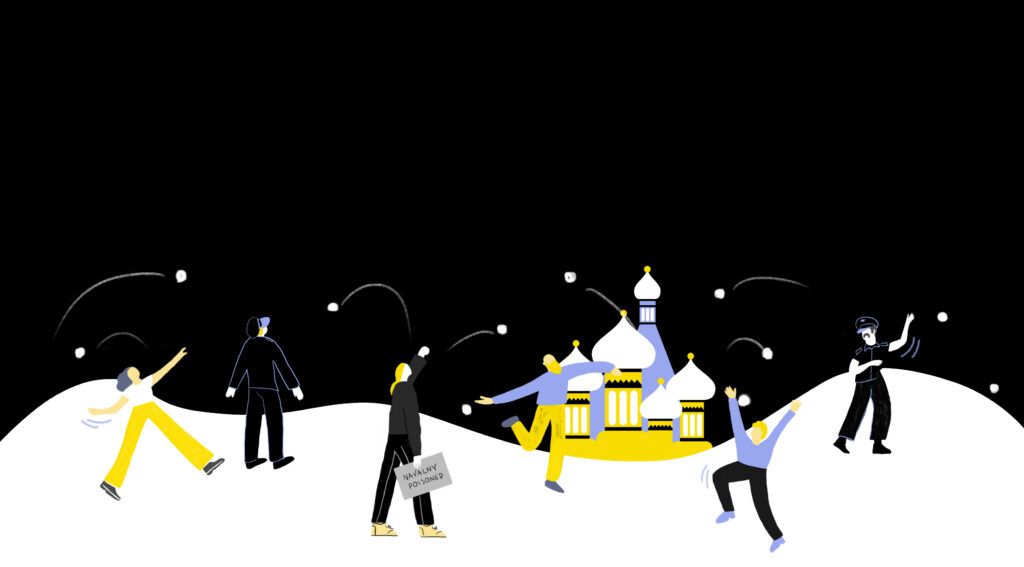Poisoning of democracy
The Navalny affair:
The protests haven’t stopped. In Russia, 40,000 people have descended on Pushkin Square in Moscow, near the government headquarters, in recent weeks, according to estimates by Reuters – the British news agency. In response to demonstrations of this magnitude, law enforcement made more than a thousand arrests and charged the crowd, who responded ironically by throwing snowballs.
These rebellions against the government, which have been moving the hearts of the Cyrillic population for several months now, seem to arise from recent events involving Russian President Putin’s main opponent, Alexei Anatolievich Navalny, a political activist of Ukrainian descent from the “Russia of the Future” party.
The rapprochement of the two leaders began when Navalny took charge of “Russia of the Future” and immediately proved to be a valid thorn in the side for the Russian president, although he did not have a broad consensus.
Surely the rivalry should not be seen as “The Good” versus “The Bad”, so much so that even navalny declared sovereign dreams of returning Ukraine and Belarus under Russian control, but as the challenge between two political leaders who have an incomparable popular consensus.
On August 20, 2020, after feeling severe abdominal pain, Alexei forced the plane on which he was traveling returning to Moscow at an emergency landing and after a few hours ended up in a coma. The next day Navalny’s spokeswoman, Kira Yarmysh, supported by the sick man’s family, asked European states for her leader to be taken to another nation to protect his health, suspecting that the pains of the day before were due to an attempt at poisoning. The answer was not long in coming, in fact on the same day a plane from Germany landed near the hospital to pick up Alexei. After an initial opposition from the Russian medical corps which considered the patient’s condition unstable, thanks to Yarmysh’s insistent requests, Navalny was transported to Germany on August 22. After a few months, the leader managed to fully recover his strength and, away from his native country, began to look for an explanation of what had happened. Navalny’s determination and the apparent involvement of the Russian state generated a very important media case that brought the main newspapers into the field.
On December 14, a joint investigation by “The Insider” and “CNN” was published into agents of the FSB, the Federal Security Service of the Russian Federation, involved in Navalny’s poisoning. The investigation focused on a special FSB unit specializing in chemicals, and newspaper investigators tracked down members of the unit involved in poisoning the Russian Opposition Leader, using telecommunications and travel data.
According to the investigation, Navalny was guarded by a group of agents of the unit for many years. “The Insider” and “CNN” following the investigation did not rule out even previous attempts at poisoning. Prior to the publication of the results of the analysis, Navalny, in a video he posted on social media, phoned Konstantin Kudryavtsev, one of the FSB agents involved, presenting himself as an official of the Russian army and asking for details as to why the attempted poisoning had failed. Kudryavtsev said the poison was applied to the seams of his underwear while Alexei was in the hotel, but that it had not been absorbed fast enough to be lethal.
Despite the overwhelming evidence, the government and Vladimir Putin always declared themselves unrelated to the affair. Alexei Navalny, despite being clearly an enemy of the Kremlin, returned to Russia on January 17, 2021, aware that he would be arrested, since in the 5 months of exile in Berlin, he had not respected the terms of the probation imposed on him by the Russian Penitentiary Service linked to an old suspended sentence. This led to him serving a three-year sentence.
Since August 20, many uprisings have begun in Russia. The people demonstrate because they do not feel free in a free state. Not to support Alexei Navalny’s sometimes extremist political ideas, but to protest against Putin’s fierce opposition to the powers that threatened him. It seems strange that it is only now, after twenty years of Putin’s rule, that the Russian people have decided to take to the streets so cohesively.
An aid to understanding this seemingly belated stance comes through an article in the online Cyrillic newspaper “Meduza” that offers a reflection on the meaning that Russians have traditionally given to the idea of freedom. Kremlin policy, since its initial days (not only with Putin), has favoured a government line that grants its citizens only a “political freedom”, defined by “volnost” and preferred that freedom should not find other forms of expression, for example the famous French motto “Liberté Egalité Fraternité” once it arrived in Russia, initially saw its first term translated as “volnost” , taking away all the spiritual conception that the motto initially had.
Despite this imprint that the government wanted to give, the people were educated and learned the ascetic sense of freedom ( in Cyrillic “svoboda”), well known by us Westerners, thanks to literature and religion. This expression arrived later in political discourse, but immediately dominated the government’s speeches, a change only of façade since the course of action remained the same.
What the people are asking for today, well represented by Navalny’s decision to return home despite being aware of his future ‘behind bars’, is that freedom of spirit should not only enter into political discourse, but should become a fundamental principle of the state. Because only when a certain idea becomes a central value, it also assumes an organizing function of public life.
In recent days Putin has amended the Russian Constitution with laws that would allow him to be re-elected until 2036. While these maneuvers were approved by the majority of the Russian political class Alexei Navalny was transferred to the hospital due to a high fever and respiratory problems that could be symptoms of Tuberculosis or Covid.

